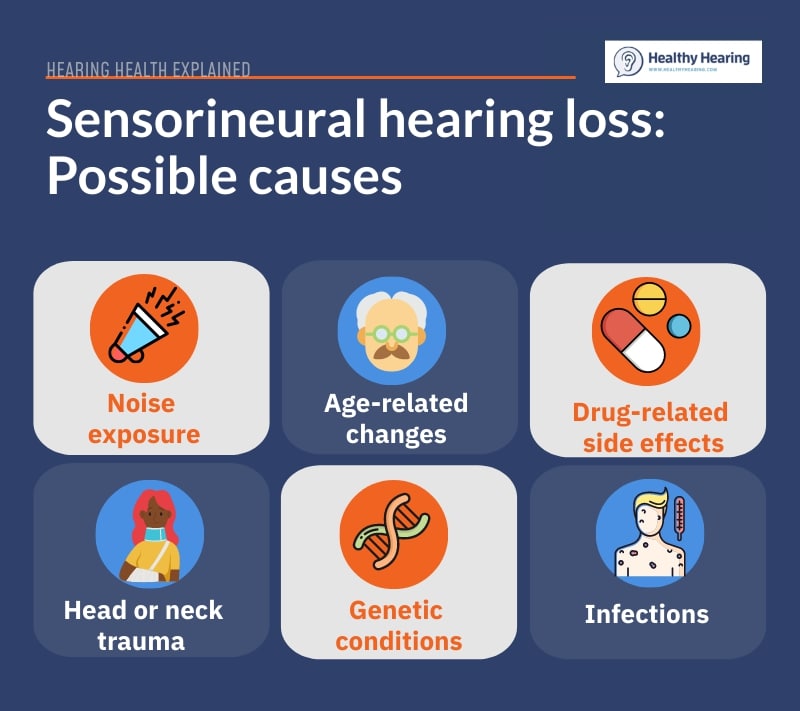Key points:
-
Sensorineural hearing loss is the most common type of hearing loss.
-
Common causes include aging, noise exposure, infections and certain genetic conditions.
-
While permanent, treatment options include hearing aids and cochlear implants.
When it comes to hearing loss, there are three main types: sensorineural, conductive and mixed. Sensorineural is by far the most common type, affecting roughly 9 out of 10 people with hearing loss.
What is sensorineural hearing loss?
Having sensorineural hearing loss (SNHL) means there is damage either to the tiny hair cells in your inner ear (known as stereocilia), or to the nerve pathways that lead from your inner ear to the brain. This damage cannot be repaired, so hearing loss is permanent.
SNHL usually affects both ears and can range from mild to profound.

What causes sensorineural SNHL?
Causes of SNHL are generally sorted into two categories: acquired or congenital. Most people have acquired hearing loss.
Acquired sensorineural hearing loss
Acquired means the hearing loss develops after a person is born, usually later in life.
Two of the most likely causes are aging and exposure to loud noise:
- Age-related hearing loss, known medically as presbycusis, is incredibly common. According to the National Institutes of Health, it affects one in three Americans between the ages of 65-74.
- Noise-induced hearing loss (NIHL) is another leading cause of sensorineural hearing loss that can affect people of any age, including teens and young adults. It can be caused by exposure to a one-time loud noise, such as an explosion or gunfire, or from sounds louder than 85 decibels (dB) over an extended period of time.
Other possible causes of acquired sensorineural hearing loss include:
- Viral infections—including measles, meningitis and mumps.
- Autoimmune disorders
- Head or ear trauma
- Acoustic neuroma (a benign tumor that grows on the nerve that connects your ear to your brain).
- Medications like chemotherapy drugs, antibiotics or even some common over-the-counter medications like aspirin can be ototoxic, which means they may harm your hearing health.
Congenital sensorineural hearing loss
Congenital sensorineural hearing loss happens during pregnancy. It's far more rare. Some causes include:
- Genetic conditions
- Prematurity
- Maternal diabetes
- Lack of oxygen during birth
- Infectious diseases passed from the mother to child in the womb, such as rubella.
What about hearing loss that comes on suddenly?
Most of the time, acquired sensorineural hearing loss occurs gradually. However, in rare cases, people can develop sudden sensorineural hearing loss that comes on right away or worsens rapidly within a few days. This type of hearing loss usually occurs in one ear.
If this happens to you, it's important to seek medical care right away, as it is possible that it can be reversed with prompt treatment.
How does SNHL affect what you hear?

a sense that you can hear but not understand.
Sensorineural hearing loss affects both the loudness and the clarity of the sounds you hear.
You may also experience a reduced range of sounds you find comfortable. Meaning, soft and normal sounds are too soft, but loud sounds very quickly get too loud and may really bother you. (In audiological terms, this is known as "recruitment.")
High-pitched sounds often hardest to hear
Sensorineural hearing loss can affect all ranges of hearing. For people with age-related hearing loss, however, it's typical to experience what's known as high-frequency hearing loss, which results in the reduced ability to hear high-pitched sounds.
This symptom can affect your ability to decipher speech, in particular certain consonant sounds. It's part of the reason why many people with sensorineural hearing loss report that they can hear but struggle to understand speech.
Other symptoms of sensorineural hearing loss
Additionally, you may experience:
- Difficulty hearing in places with lots of background noise
- Trouble following phone conversations
- Needing to turn the volume up on the TV or radio louder than you used to
- A ringing or buzzing in the ears (tinnitus)
- Feeling mentally fatigued after conversations
Treatment options
Even though sensorineural hearing loss is permanent, treatment options exist to help improve your hearing and make it easier to stay connected to those around you.
Hearing aids
In most cases, you'll be treated with hearing aids tailored to your specific hearing loss. It's essential to visit with a hearing specialist so that they can perform a comprehensive evaluation including a hearing test to determine your individual needs. Once they have your results, you can work together to find the right device for you.
In some cases—especially if hearing loss is severe or profound— your hearing specialist may recommend a cochlear implant as the better option.
Finding a hearing specialist who can help
Hearing loss can feel isolating, but it doesn’t have to be. With the right support, many people find they can reconnect with the conversations, relationships, and everyday sounds that bring joy and meaning to their lives.
If you're ready to take the next step, visit our hearing clinic directory to find a trusted professional near you — and start your journey toward better hearing.
The above is the interpretation of Sensorineural Hearing Loss: Top Causes and Risk Factors provided by Chinese hearing aid supplier Shenrui Medical. Link https://www.srmcm.com/Blog/Sensorineural_Hearing_Loss_Top_Causes_and_Risk_Factors.html of this article is welcome to share and forward. For more hearing aid related information, please visit Blog or take a look at our Hearing aids products















